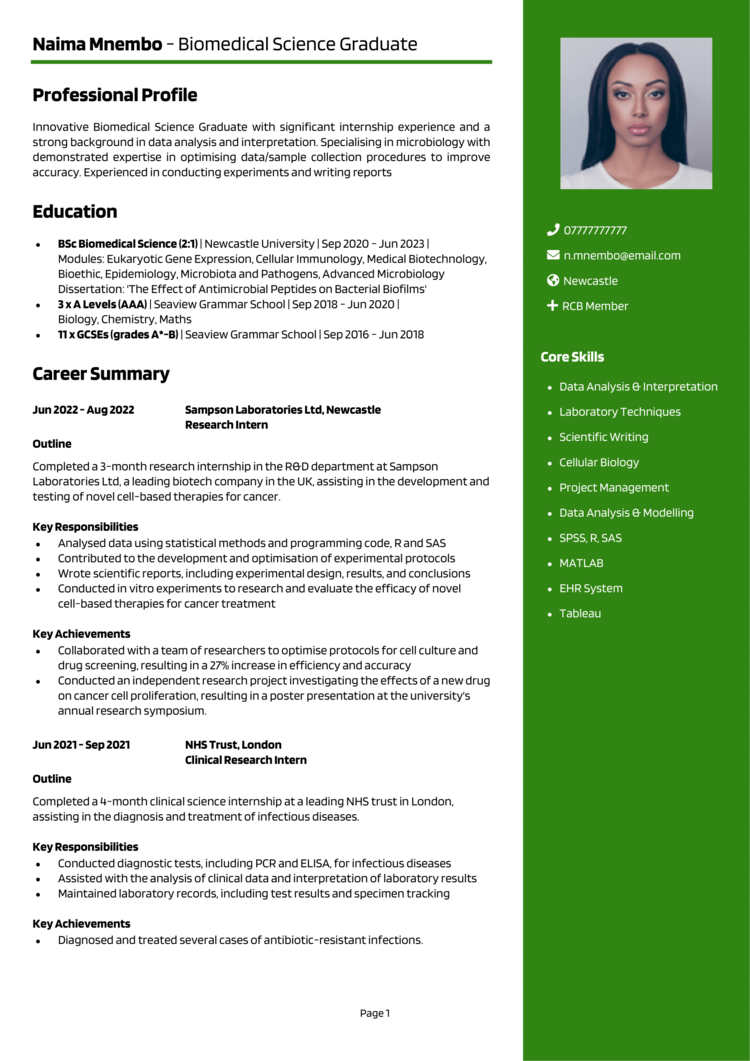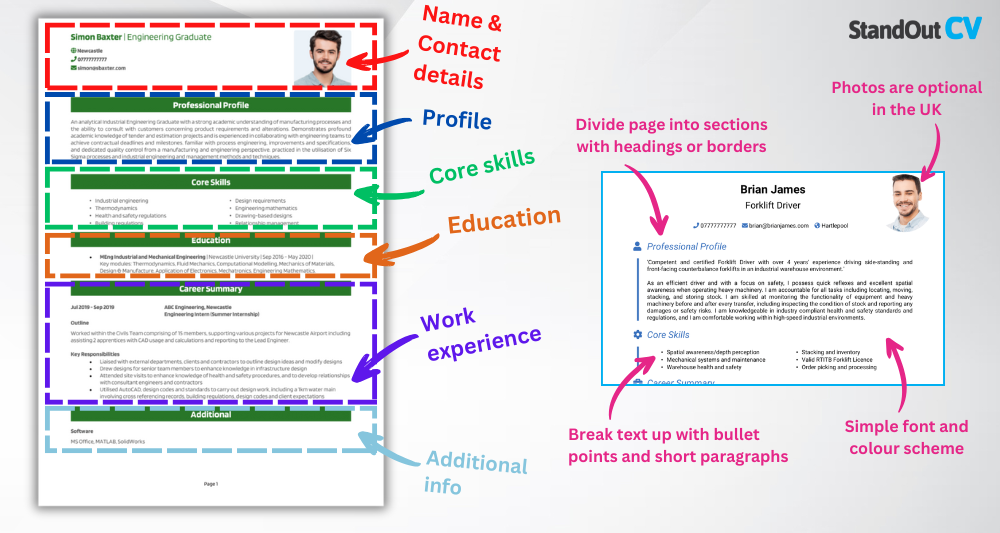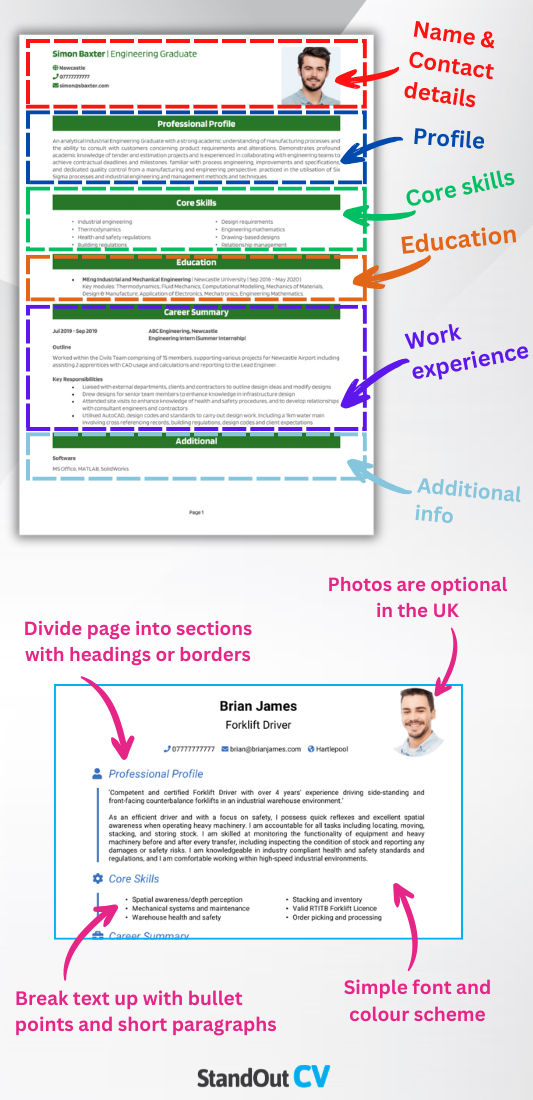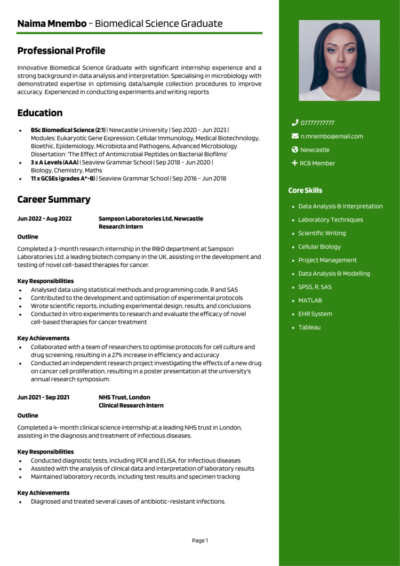You’ve completed the coursework, tackled the lab practicals, and probably spent more time with a microscope than your mates. Now it’s time to turn that hard-earned degree into a career in biomedical science.
This guide and its Biomedical Science Graduate CV example will help highlight your academic projects and most importantly, your future potential – so you can land a role where your scientific knowledge actually gets used (and not just admired by your parents).
Biomedical Science Graduate CV

How to write your Biomedical Science Graduate CV
Discover how to create a quality Biomedical Science Graduate CV with this simple step-by-step guide.
Writing a CV as a science graduate might not feel scientific – but it’s all about clear structure, strong evidence, and presenting your findings (aka your achievements) in a compelling way.
In the sections ahead, you’ll learn how to build a CV that showcases your academic background and your hands-on experience in labs to convince recruiters that you’ve got a bright future ahead in a science career.
How to structure and format your Biomedical Science Graduate CV


Biomedical science is detail-oriented and methodical – and your CV should reflect the same level of organisation and precision. Recruiters, especially in STEM fields, want to see your qualifications and technical competencies clearly laid out, with no ambiguity or waffle. Even the greatest minds will be overlooked if their CV is messy and riddled with mistakes, so stick to a clear layout.
Here’s the structure to follow:
- Name and contact details – Ensure your name and personal details are easily visible at the top. A photo is optional and depends on the role.
- Profile – Craft a short introduction that showcases your professional background and key accomplishments.
- Core skills – Provide a quick overview of your top skills that show why you’re a great fit.
- Work experience – Outline your career progression in reverse order, emphasising your contributions and successes.
- Education & certifications – Provide details on your academic background, including certifications or specialised training.
- Additional info – You can add hobbies or awards here that reflect your enthusiasm for the industry.
Use bullet points to break down details, and make sure each section is introduced with a bold heading. Choose a clear, professional font and keep the whole document under two pages in length. Save any extra for the thorough cover letter you should be attaching to each job application. The way your CV format reads should tell recruiters you’re as capable of clear communication as you are of complex analysis.
How to write a Biomedical Science Graduate CV profile


Your CV profile section is your introduction to employers. Use it to set the tone – where your interests lie, and where you see yourself heading. Make it clear from the start that you’ve got both the scientific foundations and the motivation to grow in the field. As a junior candidate with little to no experience, go with a longer personal statement which lets you discuss your aspirations more.
Biomedical Science Graduate CV profile examples
Profile 1
Motivated Biomedical Science graduate with hands-on experience supporting diagnostic workflows in a private clinical laboratory. Skilled in preparing samples, maintaining equipment, and logging data with precision. Demonstrated strong attention to detail and reliability in high-throughput environments, ensuring quality and compliance with lab protocols.
Profile 2
Curious and research-focused Biomedical Science graduate with academic experience gained through a structured research internship in antimicrobial resistance. Assisted with molecular biology techniques, literature reviews, and data handling. Comfortable working in lab-based environments and presenting findings in academic settings, with a keen interest in infectious disease research.
Things to include in your Biomedical Science Graduate CV profile
Here’s some tips on what you should include:
- Where you studied – University and degree focus (e.g. biomedical science, immunology, pathology).
- Your top qualifications – Honours classification, key lab-based modules, or additional certifications.
- Essential traits – Analytical thinking, attention to detail, teamwork, data analysis.
- Technical focus areas – Lab experience, diagnostic testing, research methods, data interpretation.
- Career goals – What you’re looking to pursue (e.g. NHS lab work, research assistant, biotech trainee).
What to include in the core skills section of your CV


This section is like your equipment checklist – what you bring to the lab or team from day one. Keep it targeted and meaningful: instead of vague terms like “hard-working,” focus on tangible skills for your CV, such as microscopy, or using data analysis software.
If you’ve worked with specific equipment, platforms (like SPSS or LIMS), or techniques (like ELISA, PCR, spectrophotometry), this is the place to flag them: you want to cover the keywords which recruiters are going to be looking for when they open up a CV.
What are the most important skills for a Biomedical Science Graduate CV?
- Laboratory Techniques and Analysis – Conducting experiments and using techniques such as PCR, spectrophotometry, and electrophoresis to analyse biological samples.
- Cell and Molecular Biology Knowledge – Applying understanding of DNA, RNA, proteins, and cell functions to research and diagnostics.
- Microscopy and Imaging – Using light and electron microscopes to examine tissues, cells, and microorganisms for clinical or research purposes.
- Data Interpretation and Reporting – Analysing experimental data, identifying trends, and presenting findings in scientific reports or presentations.
- Aseptic Technique and Contamination Control – Performing procedures in sterile environments to ensure accuracy and safety in laboratory settings.
- Clinical Biochemistry and Haematology Understanding – Interpreting blood chemistry and cellular composition to assist in diagnosing diseases.
- Use of Laboratory Equipment – Operating centrifuges, autoclaves, pipettes, and automated analysers in compliance with safety standards.
- Scientific Literature Review – Researching peer-reviewed journals and current studies to inform experimental design and stay up to date.
- Regulatory and Ethical Compliance – Understanding and adhering to ethical standards and laboratory regulations such as COSHH and GDPR.
- Teamwork in Research Settings – Collaborating with researchers, technicians, and healthcare professionals on lab-based projects and investigations.
How to list your educational history


As a graduate, this section will be one of the most important. Start with your most recent qualification – your degree – followed by any diplomas, A-levels, or relevant short courses you’ve completed.
If you’re short on work experience, expand on this section by mentioning specific lab-based modules, final-year research, group projects, or thesis topics. Include any part of your education that demonstrates your technical ability and academic strengths.
Example education sections
Education 1
Upper Second Class BSc (Hons) Biomedical Science | University of Birmingham | 2020–2023
Modules included Immunology, Molecular Biology, Clinical Biochemistry, and Pharmacology. Completed a final-year research project on antibiotic resistance in hospital-acquired infections, achieving a First for the dissertation.
3x A-Levels (A–B) | Walsall Sixth Form College | 2018–2020
Subjects: Biology, Chemistry, Psychology
9x GCSEs (A*–C) | Westcroft High School | 2016–2018
Education 2
First Class BSc (Hons) Biomedical Sciences | University of Leeds | 2019–2022
Modules included Genetics, Pathophysiology, Cell Biology, and Medical Microbiology. Carried out a lab-based dissertation examining cancer biomarker detection techniques, presented at the undergraduate research conference.
BTEC Level 3 Extended Diploma in Applied Science (D*D*D) | Northfield College | 2017–2019
10x GCSEs (A–C) | Greenhill Academy | 2015–2017
What to include in your education section
For each qualification, add the following info:
- Qualification & organisation – Name the certification and the institution which awarded it.
- Dates studied – Just provide the start month and year, and the end (or expected end) dates.
- Extra details – If there were any particularly relevant modules, expand on those to detail their specific application to the roles you’re applying for.
What are the best qualifications for a Biomedical Science Graduate CV?
- BSc (Hons) in Biomedical Science – The core qualification for most roles in this field.
- IBMS-Accredited Degree or Placement – Essential for many NHS laboratory roles.
- Laboratory Health & Safety Certification – Shows lab-readiness and awareness.
- CPD in Biomedical Techniques (e.g. PCR, immunoassays) – Adds weight to technical capabilities.
- Membership with the IBMS (Institute of Biomedical Science) – Demonstrates career commitment.
How to write a strong work experience section for your CV


Even if you don’t have years of lab work behind you, you still have relevant experience – placements, part-time jobs, group projects, and research assignments all count. Focus on showing transferable skills like data handling, attention to accuracy, working under supervision, or managing your time under pressure.
List your most recent roles or experiences first. Include your job title, employer or university, and the dates. Then break it down using bullet points to explain what you did and how it relates to your chosen field.
The best way to structure job entries on your CV

- Outline – Describe the setting (lab, research group, hospital, etc.) and your role.
- Responsibilities – Use action words like “conducted,” “tested,” “analysed,” or “collaborated.”
- Achievements – Highlight what you contributed: “Carried out PCR tests with 95% accuracy,” “Worked on data analysis for a study later published in a university journal,” “Improved sample tracking system during internship.”
Sample jobs for Biomedical Science Graduates
Research Intern | Department of Molecular Biology, Westbury University
Outline
Completed a 3-month summer placement assisting in a research project on antimicrobial resistance within an academic lab setting.
Responsibilities
- Carried out basic microbiological techniques including streak plating and serial dilutions.
- Prepared media and reagents in line with safety and contamination guidelines.
- Assisted in PCR setup, gel electrophoresis, and data collection for analysis.
- Maintained detailed lab notebooks and assisted with literature reviews.
- Participated in weekly lab meetings and presented findings to the research team.
Achievements
- Helped the team complete its pilot study phase two weeks ahead of schedule.
- Commended by the lead researcher for careful lab work and documentation.
- Contributed data later published in an internal departmental paper.
Laboratory Assistant | Solentra Diagnostics
Outline
Provided support to the clinical laboratory team at a private diagnostics company, assisting with sample processing and daily operational tasks in a fast-paced testing environment.
Responsibilities
- Prepared biological samples for analysis under supervision of senior scientists.
- Maintained cleanliness and calibration of lab equipment and ensured accurate labelling.
- Recorded data from tests and entered results into the laboratory information system.
- Followed strict protocols for sample storage, transport, and disposal.
- Assisted in maintaining reagent inventories and restocking supplies as needed.
Achievements
- Contributed to a team processing over 1,000 patient samples per week with 100% lab accuracy.
- Helped reduce turnaround times by improving sample logging procedures.
- Received positive feedback for diligence and adherence to quality standards during audits.
Additional info


For a biomedical science graduate, the Additional Information section can help you stand out by showcasing personal interests, academic achievements, and scientific curiosity beyond the lab. When you’re early in your career, this section adds depth to your CV and highlights qualities like precision, dedication, and initiative that are essential in scientific roles.
Good additional info for Biomedical Science Graduates
- Hobbies – Choose interests that reflect analytical thinking, attention to detail, or a passion for science – like reading science literature, DIY electronics, or lab-related creative projects.
- Awards and Achievements – Academic recognitions, poster presentations, or competition placements can show both expertise and commitment to the field.
- Extracurricular Activities – Membership in science societies, research groups, or outreach roles shows initiative and engagement with the wider scientific community.
- Personal Projects – Any independent research, science communication efforts, or data analysis projects highlight a proactive approach to learning and professional development.
Additional info example
Additional info
Hobbies
Science communication – Write and share accessible summaries of new medical research on social media to improve public understanding of science.
Photography – Special interest in macro photography of natural specimens, combining attention to detail with creativity.
Reading medical history – Explore how past discoveries shaped modern medicine, deepening my appreciation for biomedical research.
Awards and Achievements
Final-year project distinction – Awarded for an investigative study into the antimicrobial resistance of E. coli strains.
Undergraduate research poster award – Recognised for clear data presentation and effective communication at a university showcase.
Extracurricular Activities
Biomedical Society committee member – Helped organise guest lectures and lab skill workshops for fellow students.
STEM ambassador – Delivered short science talks at local schools to promote interest in medical sciences.
Personal Projects
PCR troubleshooting guide – Compiled a practical troubleshooting manual from personal lab experience and shared it with fellow students.
Health blog contributor – Wrote articles explaining current research in immunology and virology for a student-led blog.





